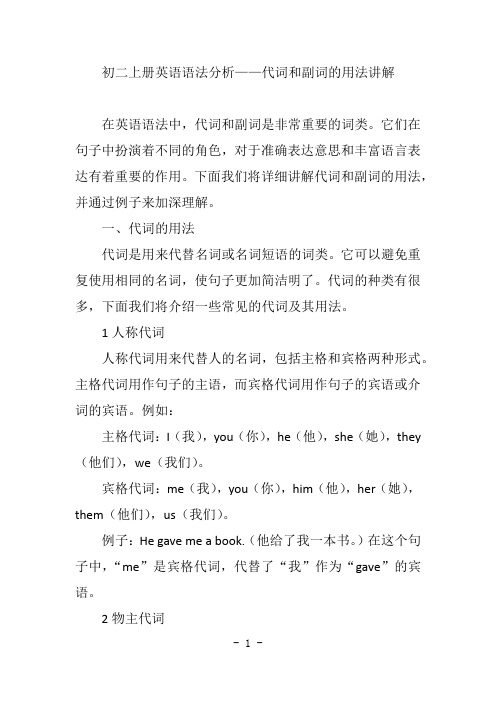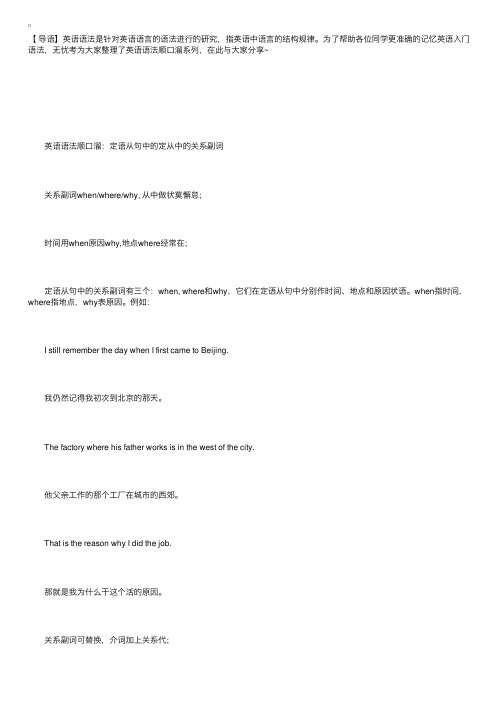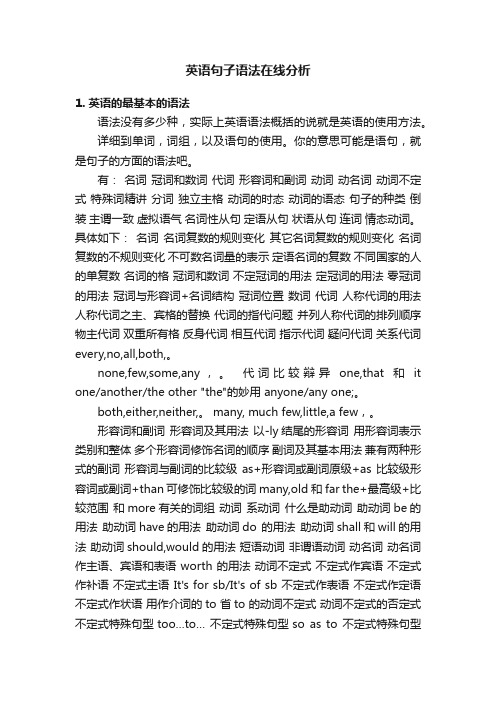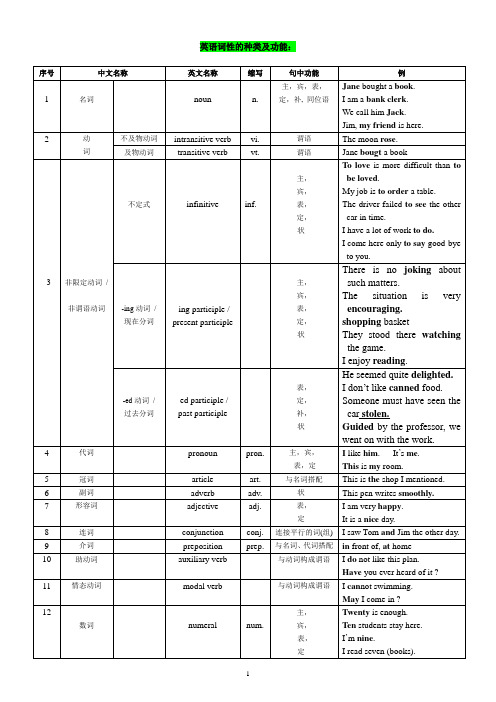英语语法副词的种类及分析
初二上册英语语法分析--代词和副词的用法讲解

初二上册英语语法分析——代词和副词的用法讲解在英语语法中,代词和副词是非常重要的词类。
它们在句子中扮演着不同的角色,对于准确表达意思和丰富语言表达有着重要的作用。
下面我们将详细讲解代词和副词的用法,并通过例子来加深理解。
一、代词的用法代词是用来代替名词或名词短语的词类。
它可以避免重复使用相同的名词,使句子更加简洁明了。
代词的种类有很多,下面我们将介绍一些常见的代词及其用法。
1人称代词人称代词用来代替人的名词,包括主格和宾格两种形式。
主格代词用作句子的主语,而宾格代词用作句子的宾语或介词的宾语。
例如:主格代词:I(我),you(你),he(他),she(她),they (他们),we(我们)。
宾格代词:me(我),you(你),him(他),her(她),them(他们),us(我们)。
例子:He gave me a book.(他给了我一本书。
)在这个句子中,“me”是宾格代词,代替了“我”作为“gave”的宾语。
2物主代词物主代词用来表示名词的所有关系,包括形容词性物主代词和名词性物主代词。
形容词性物主代词后面要接名词,而名词性物主代词可以独立使用,相当于一个名词。
例如:形容词性物主代词:my(我的),your(你的),his(他的),her(她的),their(他们的),our(我们的)。
名词性物主代词:mine(我的),yours(你的),his(他的),hers(她的),theirs(他们的),ours(我们的)。
例子:This is my book.(这是我的书。
)在这个句子中,“my”是形容词性物主代词,修饰了名词“book”。
3指示代词指示代词用来指示或识别名词或代词,包括this(这个),that(那个),these(这些),those(那些)。
例如:This is a pen.(这是一支笔。
)That is a book.(那是一本书。
)4相互代词相互代词用来表示两者或两者以上的相互关系,常用的有each other(互相)和one another(彼此)。
英语语法:定语从句中的关系副词

【导语】英语语法是针对英语语⾔的语法进⾏的研究,指英语中语⾔的结构规律。
为了帮助各位同学更准确的记忆英语⼊门语法,⽆忧考为⼤家整理了英语语法顺⼝溜系列,在此与⼤家分享~ 英语语法顺⼝溜:定语从句中的定从中的关系副词 关系副词when/where/why, 从中做状莫懈怠; 时间⽤when原因why,地点where经常在; 定语从句中的关系副词有三个:when, where和why,它们在定语从句中分别作时间、地点和原因状语。
when指时间,where指地点,why表原因。
例如: I still remember the day when I first came to Beijing. 我仍然记得我初次到北京的那天。
The factory where his father works is in the west of the city. 他⽗亲⼯作的那个⼯⼚在城市的西郊。
That is the reason why I did the job. 那就是我为什么⼲这个活的原因。
关系副词可替换,介词加上关系代; 关系副词可以由介词加上which来替换。
例如: 1)This is the house where (in which) I lived two years ago. 在这句中,where= in which 2) Do you remember the day when (on which) you joined our club? 在这句中,when= on which 3) This is the reason why (for which) he came late. 在这句中,reason= for which 关系代,关系代,that与who要除外; 挑选介词要聪明,必看动词和先⾏; 介词后可⽤关系代词,但只能⽤which或whom,不能⽤that 和who。
那么,这个介词怎么选呢?其⼀,可以看定语从句中的谓语动词;其⼆,可以看先⾏词。
八年级上英语常用语法知识——副词(含解析)

一、选择题1.—Are you really willing to do so much homework?—To tell you the truth, sometimes I ________ to do that, but I think it really helps me. A.force B.am forced C.forced D.was forced B解析:B【解析】【详解】句意:——你真的愿意做这么多作业吗?——说实话,有的时候我是被迫的,但我觉得它对我真的很有帮助。
考查一般现在时的被动语态。
sometimes有时,一般现在时。
根据句意可知,我是被迫做这么多作业,某人被迫做某事sb be forced to do sth。
故选B。
2.Too much water________ every day in the world. We should save it.A.wasted B.are wasted C.is wasted D.was wasted C解析:C【解析】【详解】句意:世界上每天都浪费太多的水,我们应该节约它。
考查动词。
wasted浪费,waste的过去式;are wasted被浪费,说明主语是复数的情况;is wasted被浪费,说明主语是单数的情况;was wasted被浪费,用于过去式,说明主语是单数的情况。
根据“every day”说明是一般现在时;根据“We should save it”可知,前句是说:太多的水被浪费。
Too much water和动词waste构成被动关系。
water是不可数名词,谓语动词用is。
根据一般现在时的被动语态结构“主语+be+及物动词的过去分词”,故选C。
3.—Please look at the sign on the right!—Oh, smoking ________ here.A.isn’t allowed B.doesn’t allow C.didn’t allow D.wasn’t allowed A 解析:A【解析】【详解】句意:——请看右边的标志!——哦,吸烟在这儿是不被允许的。
英语句子语法在线分析

英语句子语法在线分析1. 英语的最基本的语法语法没有多少种,实际上英语语法概括的说就是英语的使用方法。
详细到单词,词组,以及语句的使用。
你的意思可能是语句,就是句子的方面的语法吧。
有:名词冠词和数词代词形容词和副词动词动名词动词不定式特殊词精讲分词独立主格动词的时态动词的语态句子的种类倒装主谓一致虚拟语气名词性从句定语从句状语从句连词情态动词。
具体如下:名词名词复数的规则变化其它名词复数的规则变化名词复数的不规则变化不可数名词量的表示定语名词的复数不同国家的人的单复数名词的格冠词和数词不定冠词的用法定冠词的用法零冠词的用法冠词与形容词+名词结构冠词位置数词代词人称代词的用法人称代词之主、宾格的替换代词的指代问题并列人称代词的排列顺序物主代词双重所有格反身代词相互代词指示代词疑问代词关系代词every,no,all,both,。
none,few,some,any,。
代词比较辩异one,that和it one/another/the other "the"的妙用 anyone/any one;。
both,either,neither,。
many, much few,little,a few,。
形容词和副词形容词及其用法以-ly结尾的形容词用形容词表示类别和整体多个形容词修饰名词的顺序副词及其基本用法兼有两种形式的副词形容词与副词的比较级 as+形容词或副词原级+as 比较级形容词或副词+than 可修饰比较级的词 many,old和far the+最高级+比较范围和more有关的词组动词系动词什么是助动词助动词be的用法助动词have的用法助动词do 的用法助动词shall和will的用法助动词should,would的用法短语动词非谓语动词动名词动名词作主语、宾语和表语 worth 的用法动词不定式不定式作宾语不定式作补语不定式主语 It's for sb/It's of sb 不定式作表语不定式作定语不定式作状语用作介词的to 省to 的动词不定式动词不定式的否定式不定式特殊句型too…to… 不定式特殊句型so as to 不定式特殊句型Why not 不定式的时态和语态动名词与不定式特殊词精讲stop doing/to do forget doing/to do remember doing/to do regret doing/to do cease doing/to do try doing/to do go on doing/to do be afraid doing/to do be interested doing/。
大学英语语法—词性的种类、功能

英语词性的种类及功能:一、句子成分的定义:构成句子的各个部分叫做句子成分。
句子成分有主要成分和次要成分;主要成分有主语和谓语;次要成分有表语、宾语、定语、状语、补足语和同位语。
二、句子成分中词性的运用(一)能作主语的词性:主语是一个句子所叙述的主体,一般位于句首。
但在there be结构、疑问句(当主语不是疑问词时)和倒装句中,主语位于谓语、助动词或情态动词后面。
主语可由名词、代词、数词、不定式、动名词、名词化的形容词和主语从句等表示。
例如:During the 1990s, American country music has become more and more popular.(名词)We often speak English in class.(代词)One-third of the students in this class are girls.(数词)To swim in the river is a great pleasure.(不定式)Smoking does harm to the health.(动名词)The rich should help the poor.(名词化的形容词)When we are going to have an English test has not been decided.(主语从句)It is necessary to master a foreign language.(it作形式主语,真正的主语为后面的不定式)(二)谓语动词:谓语说明主语所做的动作或具有的特征和状态,固只能用动词在句中作谓语,一般放在主语之后。
谓语的构成如下:1、简单谓语:由一个动词或动词短语构成。
如:He practices running every morning.2、复合谓语:(1)由情态动词或其他助动词加动词原形构成。
如:You may keep the book for two weeks. He has caught a bad cold. (2)由系动词加表语构成。
初中英语语法—形容词、副词PPT课件

2. Don’t worry. There is __C__ about your illness.
A.serious something B. anything serious
C. nothing serious D. some thing
3.There is __C__ in today’s newspaper. It’s boring.
1.Is there anything interesting in today’s newspaper ?
2. I have something important to tell you.
-
7
1. Sam is hungry, he’d like to eat _C___delicious.
A. some B. any C. something D. somewhere
The windows of our classroom are cleaner than those of theirs.
-
23
1、as+形容词原形+as
Tom is as tall as Mike.
There are as many students in our
school as yours.
3、… too+原级+ to do sth.
He is too young to join the army.
4、形容词原级+ enough to do sth.
This truck is big enough to carry 5 tons.
-
25
1、两者之间的比较,句中有明显的标志词than
Tom is taller than John
英语语法形容词和副词
4I love you very much.我很爱你。(副词 very修饰副词much)
副词的分类
1)时间副词:表示“事情发生的时间” now 现在 then 那时 today 今天 yesterday 昨天 2)地点副词:表示“事情发生的地点、位
不规则变化
原级 good/well好的
bad/ill坏的 many/much多的
little少的
比较级 better worse more less
最高级 best worst most least
far远的
farther/further farthest/furthest
old年老的
older/elder oldest/eldest
形容词比较级的用法
1)A+be+形容词比较级+than+B A比B·····
My arms are longer than yours. 我的手臂比你的长。
Beijing is more beautiful than Shenzhen.
北京比深圳美。
2)数字+形容词比较级+than Tom is 10 cm taller than me. Ana is 2 years older than me. The dictionary is 1kg heavier than that
We should study hard.我们应该努力学习。 You walk too fast.你走得太快了。
(2)副词修饰形容词时,通常放在形容词 的前面。如:
The boy is too young to go to school.那个 小孩子太小,不能去 上学。
【初中英语语法 词性】形容词和副词易错点分析
【初中英语语法词性】形容词和副词易错点分析形容词和副词都是英语词类中的重要词类,由于同学们对它们的特性和用法掌握的不好,所以在具体使用过程中会经常出错。
这里我们将常见的错误加以归纳并作分析,以供同学们学习参考。
1.请注意!我们有重要的事情要告诉你们。
误:Attention, please! We have got important something to be told to you.正:Attention, please! We have got something important to tell you.析:当形容词修饰someone, something, somebody, anyone, anything, anybody, nothing, nobody等不定代词时,常常放在这些不定代词的后面,作后置定语。
2.这种苹果好吃又好卖。
误:This kind of apples taste well and sell good.正:This kind of apples tastes good and sells well.析:当taste表示“味道”和“尝起来”的意思时,常常作系动词使用,后面要接形容词作表语;而sell well是一个固定搭配,表示“卖得好”,“畅销”等意思。
句中的this kind of后面接可数名词复数,整个词组一起作主语时,谓语动词的形式应该和kind 的数保持一致。
此句中的kind为单数形式,所以两个并列的谓语动词也应该用单数形式。
3.那么小的孩子们在那么短的时间内完成那么多的作业真是太难了。
误:It is hard for so little children to finish such much homework in so a short time. 正:It is hard for such little children to finish so much homework in such a short time.析:此处的so是副词,用来修饰形容词much,such是形容词,用来修饰名词children。
英语基础语法——形容词和副词及其比较级(专升本英语)
1. 大多数形容词在词尾加_______。 careful—carefully,quick—quickly,bright—brightly
[答案] C [解析]本题考查副词辨析。importantly 重要地; successfully 成功地; increasingly 不断增加地,越来越多地; mostly 主要地,大部分,通常 [翻译]随着越来越多的人拥有自己的车,旅行在中国变得越来越受欢迎。
Vocabulary and Structure
Raw meat must be separate from cooked meat. 生肉和熟肉必须分开。
即学即练 Teachers need to be_____the emotional, intellectual and physical changes that
students experience.
Class is over的名词之前。 如: a new book, two big trees 等。
考试中一般考察形容词的词义辨析,形近词辨析。
即学即练
________cultures such as Chinese knots, Chinese paper cutting and Chinese opera are deeply loved by students. A. Social B. Modern C. Traditional D. Natural
形容词的位置——需注意
present (1)可以作形容词,意为 “现存的,当前的”时,作前置定语,且只能用在名词之前 ; 如:He can cope with the present situation. 他能够应付当前的局势。
(2)意为“(人)出现,出席,在场” 时,常作后置定语。 如:Everyone present was enthused by the idea. 在场的每一个人都为这种想法感到激动
通用版2021届高考英语一轮专题巡练考点07形容词和副词考点详解含解析
考点(kǎo diǎn)07 形容词和副词形容词和副词在高考试题中始终占很重要的地位(dìwèi)。
近几年高考对形容词和副词的考查具有“淡化语法、注重深层语义”的特点,以形容词和副词辨析为热点,同时(tóngshí)也加强(jiāqiáng)对形容词和副词比较等级(děngjí)的考查及其之间的相互转化。
其考点主要包括:1.考查形容词和副词词义辨析。
2.考查形容词修饰名词时的词序,即指示代词/不定代词+数词(序数词、基数词)+描绘性形容词+特征性形容词(大小、长短、高低、形状、年龄、新旧)+颜色形容词+国籍、出处+物质、材料+用途、类别+中心名词。
3.考查形容词和副词的比较等级及其常用句型及其修饰成分在句中的位置;形容词和副词之间的转换;名词转换为形容词等。
4.考查与形容词和副词有关的习语结构。
5. 对与形容词和副词有关的构词法的考查仍会成为语法填空的重点之一。
一、平级比较1. "as+形容词+(a/an)+名词+as"表示同级比较,注意中间的形容词和名词并列时各自所在的位置。
☞It is generally believed that teaching is as much an art as it is a science.人们普遍认为,教学是一门科学,同时也是一门艺术。
2. "as+形容词/副词(fùcí)的原级+as"与"not as/so+形容词/副词的原级+as"表示同级比较,即两个或两部分人或物在性质上或程度(chéngdù)上相同(不同)。
☞The work is not as/so difficult as you imagine.这项工作(gōngzuò)不是像你想像的那么难。
二、比较级1. 比较级的修饰语有: rather, much,still, any(否定句、疑问句中), even, far, a lot,a bit, a little, a great deal等。
- 1、下载文档前请自行甄别文档内容的完整性,平台不提供额外的编辑、内容补充、找答案等附加服务。
- 2、"仅部分预览"的文档,不可在线预览部分如存在完整性等问题,可反馈申请退款(可完整预览的文档不适用该条件!)。
- 3、如文档侵犯您的权益,请联系客服反馈,我们会尽快为您处理(人工客服工作时间:9:00-18:30)。
英语语法副词的种类及分析一.什么是副词副词(adverb)修饰动词、形容词和其他副词等,说明时间、地点、水准、方式等概念。
如:often往往,here 这里,very很,quickly很快地。
二.副词的构成1)本身就是副词,如now现在,there那里,here。
2)由形容词加词尾-1y变来,如firmly坚决地,happi1y幸福地。
long adj. 长的,长久的long adv. 长久地三.副词的种类副词可分为下列几种:1)普通副词(ordinary adverb)如:together一起,well好,seriously认真地,slowly慢,carefully小心地。
2)疑问副词(interrogative adverb)如:when何时,where何地,how如何,why为何。
3)关系副词(relative adverb)如:where,when。
4)连接副词(conjunctive adverb)如:then然后,so所以,there{ore所以,however不过,hence所以,thus这样,nevertheless不过,otherwise否则,still不过,仍然。
四.副词的用法副词在句中可用作:1)状语(这是副词在句子中的主要功用)It is raining hard.雨下得很大。
(副词hard作状语,修饰动词is raining。
)Don't drive too fast.车子不要开得太快。
(fast是副词,作状语,修饰动词drive,副词too又修饰副词fast。
) He speaks English quite well.他英语讲得相当好。
(well修饰动词speaks,quite又修饰副词well。
)He always helps his sister with her homework.他总是协助他妹妹做家庭作业。
(always修饰动词helps) She often went there.她常到那儿去。
(often和there均是副词,修饰动词went。
)Maybe he will telephone later.也许他以后会打电话来的。
(maybe是副词,用以修饰全句。
)2)表语 Is he up?他起床了没有? She is out.她出去了。
3)定语Life here is full of joy.这儿的生活充满了欢乐。
(here修饰名词life)五.副词的位置1)修饰动词时,有三种位置。
2)修饰形容词和副词作状语时,须放在被修饰词之前。
如:It is a very difficult job,这是一件非常困难的工作。
(very修饰形容词difficult)He runs very fast.他跑得很快。
(very修饰副词fast)3)副词作定语时,一般放在被修饰的名词之后。
如:The peasants there are busy digging a canal now.那里的农民现在正忙于修水渠。
On my way home,I met groups of Young Pioneers.在回家的路上我遇见成群的少先队员。
六.副词的比较等级和形容词同形的副词的形式变化与形容词完全相同。
但以词尾-1y结尾的副词(注意early一词的-1y不是副词的词尾)须用more和most。
另外,须注意下面例词中well,badly的不规则变化。
如:原级比较级最高级hard 努力地harder hardestfast 快faster fastestwell 好better bestbadly 坏 worse worstearly 早 earlier earliestquickly 快 more quickly most quicklyhappily 快乐地 more happily most happily副词比较等级的用法1)副词比较级的用法与形容词比较级相似。
如:David drives faster than anyone I know.大卫开车比我所知道的任何人都要快。
She plays table tennis better than I.她乒乓球打得比我好。
(从句中省略了play table tennis) Mr. Martin usually gets to the office earlier than others.马丁先生到办公室通常比别人早。
2)副词最高级用法,除副词前能够不用the外(用the也能够),其余与形容词最高级相同。
如:I work fastest when I'm under pressure.我在有压力时工作得最快。
He swims {the} best in Class One.一班他游泳最好。
七.比较等级的一些特殊用法 as...as;not so. . .as或not as...as1)表示"相等"用as...as。
2)表示"不相等"用not so...as或not as...as。
如:This knife is as sharp as that one.这把刀跟那把一样快。
Bill is as tall as I. 比尔和我一般高。
You know as well as I do.你和我一样明白。
3)表示水准可用much,far,still,even,a 1itt1e,no,any,等状语来修饰形容词和副词的比较级。
如: The Yellow River is long,but the Changjiang River is even longer.黄河长,长江更长。
Wang is taller than Zhang. Li is still than Wang. 王比张高,李比王还高。
初中英语语法专项习题副词1 ( ) 1 He speaks English___his aunt.A. as good asB. as well asC. as better asD. as best as( ) 2. Which do you like_____, skating, swimming or fishing?A. moreB. mostC. betterD. best( ) 3 Who sings___, Rose or Kate? A. well B. good C. better D. best( ) 4 She writes____than I.A. more carefulB. much carefulC. much more carefullyD. much carefully( ) 5 The night was very ___, so he had to take off his shoes ___.A. quiet; quietlyB. quite; quicklyC. late; quickD. quite; quietlyow ___ the girls are playing!A. happy B. happier C. happy ly D. happily2 ( ) 1 ____ he drops in ___ his friends after supper.A. Some times; forB. Sometimes; onC. Often; forD. Seldom; on( ) 2 In Britain tea ___ with milk or sugar in it.A. usually drinksB. is usually drunkC. usually is drunkD. drank usually( ) 3 He____ to school to clean his classroom.A. always comes earlyB. comes always earlyC. always early comesD. come always earlier3 ( ) 1 Better___than never.A. lateB. the laterC. laterD. the late( ) 2 We have been to the China Folk Culture Villages ____.A. latelyB. lateC. latestD. last( ) 3 I got up____today.A. laterB. more latelyC. latelyD. late4 ( ) 1 Today Tom goes to school earlier than___.A. as usualB. usualC. usuallyD. ago( ) 2 Today we do our homework at home ___.A. than usualB. oftenC. usuallyD. as usual( ) 3 Alice___goes to school at seven.A. usualB. usuallyC. hardD. a little5 ( ) 1 It was___ bad weather that we all had to stay inside.A. veryB. soC. ratherD. such( ) 2 He is___ kind an old man that all the children like him.A. veryB. soC. ratherD. such( ) 3 He, our headmaster was___ pleased with our work.A. fairlyB. evenC. muchD. great( ) 4 There was a heavy snow last night. This morning is____ outside.A. too rather coldB. rather too coldC. such coldD. fairly cold6 ( ) 1 We won't go to the cinema next Saturday. They won't____.A. tooB. alsoC. neitherD. either( ) 2 She likes reading and___.A. so I doB. I do soC. I like soD. so do I( ) 3 -I won't go to the Great Wall tomorrow.-I won't, ___.A. neitherB. eitherC. tooD. also( ) 4 He likes to do some reading in the morning, I like it, ___.A. tooB. eitherC. neitherD. also( ) 5 He didn't know her address, ____ did I.A. tooB. alsoC. eitherD. neither7 ( ) 1 I have never seen ___ big pears.A. suchB. veryC. soD. rather( ) 2 He is ___ tired that he can't go any farther.A. soB. such -C. veryD. too( ) 3 That maths problem is ___ difficult ___ nobody can work it out.A. too; toB. very; thatC. so; thatD. very; but( ) 4 He is , teacher that all of us like him.A. such good aB. a so goodC. so good aD. a such good( ) 5 Jack doesn't work ____ Tom.A. as so goodB. so good asC. so hard asD. so harder as8 ( ) 1 I did my homework hours _____.A. beforeB. laterC. agoD. late( ) 2 I saw the film two days ___.A. agoB. beforeC. afterD. late( )3 I seem to have met you___.A. beforeB. agoC. yetD. some time9 ( )1 He got back____at four.A. to homeB. at homeC. his homeD. home( ) 2 Come____ quickly. I have something interesting to tell you.A. to hereB. up to hereC. hereD. into here( ) 3 These two young men stood ___ watching the train moving away.A. by thereB. from thereC. thereD. to there10 ( ) 1 Mother said, "Tom, you're seventeen, ____a child. "A. no againB. not longerC. not moreD. no longer( ) 2 "Don't do that___. " the teacher said to Tom.A. no moreB. no longerC. any moreD. some more( ) 3 I don't want to talk with you____.A. yesterdayB. no longerC. any longerD. some longer( ) 4 They have moved away from Beijing. They don't live there____.A. any longerB. once moreC. eitherD. again11 ( ) 1 My aunt will come back from Beijing ____.A. before longB. long beforeC. after longD. long after( ) 2 She read the book___. And I'll read it___.A. long before; long beforeB. before long; before longC. before long; long beforeD. long before; before long12 ( ) 1 When you do eye-exercise, you must keep your eyes____.A. closeB. closesC. closingD. closed( ) 2 It's a windy day. You'd better____ the windows.A. closeB. closedC. closingD. to close( ) 3 Bruce often ___ his left hand ___.A. keep; closeB. keeps; closedC. keep; closedD. keeps; close( ) 4 It is very hot. Please keep the door .A. openB. openingC. opensD. opened13 ( ) 1 The boat is left ___ by the bank of the river.A. alongB. aloneC. longD. lonely( ) 2 He has a rest___ at home, watching TV.A. aloneB. oneC. alongD. lonely( ) 3 They went out for a walk___ the lake.A. aloneB. alongC. lonelyD. at( ) 4 The wall is two metres____.A. highlyB. widelyC. longD. along( ) 5 There is a___ island. On it there are many wild beautiful flowers.A. lonelyB. alongC. /D. alone14 ( ) 1 The city is___ than the town away from the river.A. farB. fartherC. so farD. much far( ) 2 Do you need ___ explanation to the question?A. more farB. any furtherC. fartherD. any far( ) 3 I am so tired that I can't walk____.A. much farB. any fartherC. even farD. very further参考答案:1. 1-6 B D C C A D2. 1-3 B B A3. 1-3 A A D4. 1-3 B D B5. 1-4 D B A B6. 1-5 D D B A D7. 1-5 A A C C C8. 1-3 C A A9. 1-3 D C C10. 1-4 D C C A11. 1-2 A D12. 1-4 D A B A13. 1-5 B A B C A14. 1-3 B B B。
